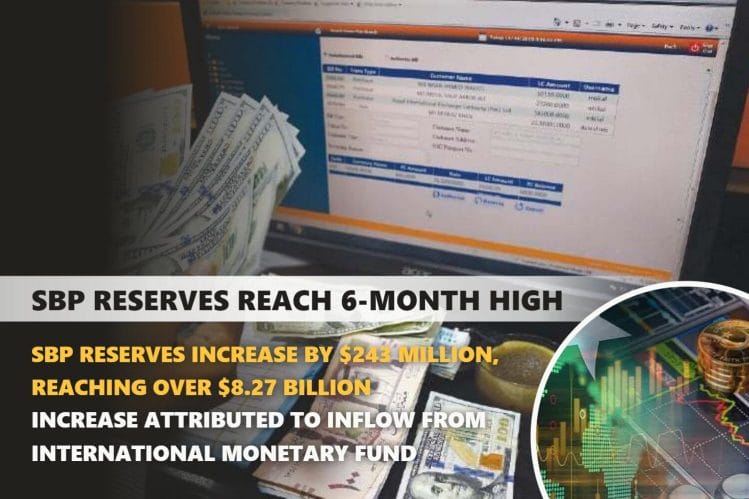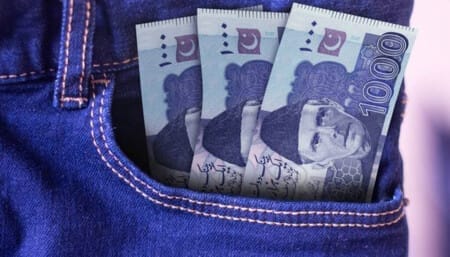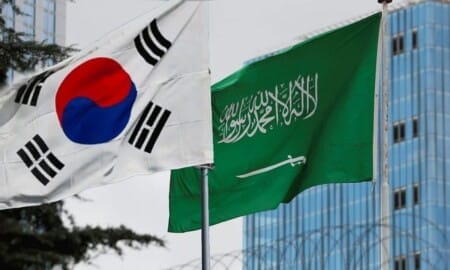The State Bank of Pakistan (SBP) has seen a significant increase in its reserves. A weekly increase of $243 million has pushed the reserves to a six-month high of $8.27 billion. This financial boost is largely due to an inflow from the International Monetary Fund (IMF).
The recent uptick in Pakistan’s foreign exchange reserves, as reported by the State Bank of Pakistan (SBP), represents a critical moment for the nation’s economy. The $243 million increase, which brings the SBP’s reserves to $8.27 billion as of January 19, signifies more than just a numerical boost—it’s a beacon of financial stability in what has been turbulent waters for the country.

With total liquid foreign reserves standing firm at $13.34 billion, including the $5.07 billion held by commercial banks, investors and policy-makers can draw a cautious sigh of relief. The reason behind this surge? A hefty inflow from the International Monetary Fund (IMF), which reflects the continued partnership and confidence between the IMF and Pakistan’s financial handlers.
Read: Understanding the Process of Registering a Company in with SECP
The disbursement of the second tranche of $705.6 million under the IMF’s Stand-By Arrangement (SBA) is particularly noteworthy. While not the entire disbursement was reflected due to debt repayments, the strategic utilization of these funds is vital for maintaining economic stability and reassuring international stakeholders of Pakistan’s fiscal management.
This positive development marks the highest level of reserves since mid-July 2023. Recall that on July 14, SBP reserves received a significant lift after the first IMF tranche, speaking volumes about the importance of such international cooperation in the realm of finance.
However, the journey is not without its challenges.
Just last week, the SBP reserves had dipped by $127 million. This ebb and flow are emblematic of the delicate nature of managing a developing nation’s forex reserves, which are crucial for meeting international debt obligations and ensuring import coverage.
The SBP’s transparent communication regarding these financial maneuvers is commendable and essential for balanced reporting. It’s not just about presenting numbers; it’s about giving stakeholders and the public a clear, analytical narrative that explains the cause and effect of these economic tides.
Total liquid foreign #reserves held by the country stood at US$ 13.34 billion as of January 19, 2024. For details https://t.co/WpSgomnKT3 #SBPReserves pic.twitter.com/vFI9pURlfF
— SBP (@StateBank_Pak) January 25, 2024
The long-term implications of these reserve fluctuations are significant. While the infusion from the IMF provides immediate relief, it’s imperative for Pakistan to leverage this moment to strengthen domestic fiscal policies and diversify its revenue streams. This will safeguard against future volatility and foster sustainable economic growth.
Moreover, quotes from financial experts and the SBP itself lend credibility to the narrative, providing an assurance that Pakistan is not just receiving funds but strategically deploying them towards debt repayment and economic stability.
The legal framework that underpins these financial aids, such as the terms of the SBA with the IMF, also plays a pivotal role in understanding the full picture. Adherence to these terms is crucial for Pakistan to continue receiving support and maintaining international credibility.
The Role of Commercial Banks in Pakistan’s Financial Resurgence
The role of commercial banks in Pakistan’s financial resurgence is crucial for the country’s economic growth and development. A robust financial sector is essential for improving living standards and promoting economic growth. In Pakistan, banks account for 95 percent of the financial sector, highlighting the importance of a sound and healthy banking system.
The financial sector has a significant impact on long-term growth through two main channels: capital accumulation and technological progress. Financial intermediaries, such as commercial banks, perform five basic functions that directly affect the real economy. These functions include mobilizing savings from domestic households and corporates, pooling and managing risk, acquiring and disseminating information about investment opportunities, monitoring borrowers and exerting corporate control, and facilitating the exchange of goods and services.
In the context of Pakistan’s challenging economic juncture, with external debt and devastating floods, the role of commercial banks becomes even more critical. They play a vital role in mobilizing savings, managing risks, and providing the necessary financial support to businesses and individuals. However, policy missteps and outflows of external debt have put pressure on the banking sector.
The central bank, the SBP, plays a significant role in the reform process of the banking sector. It is responsible for maintaining stability and ensuring the soundness of the financial system. The SBP has taken measures to address the challenges faced by commercial banks, including increasing foreign exchange reserves and implementing policies to attract investment.
Overall, the role of commercial banks in Pakistan’s financial resurgence cannot be understated. They are crucial for facilitating economic growth, managing risks, and providing the necessary financial support to businesses and individuals. The central bank’s role in the reform process is essential for ensuring the stability and soundness of the banking sector.
Impact of IMF Inflow
The IMF’s contribution has had a significant impact on the SBP’s reserves. The latest increase comes on the back of the second tranche of $705.6 million from the IMF under the Stand-By Arrangement (SBA). This has led to the highest level of reserves since July 2023.
To Wrap Up
In conclusion, Pakistan’s financial resurgence and the significant increase in the SBP’s foreign exchange reserves are a testament to the country’s resilience and strategic measures. Despite facing challenges from the external environment and policy missteps, Pakistan has managed to bounce back and strengthen its financial position. The devastating floods may have initially impacted the reserves, but the country’s ability to recover and rebuild has played a crucial role in the impressive growth. Furthermore, the active participation of commercial banks has been instrumental in supporting Pakistan’s financial resurgence.












